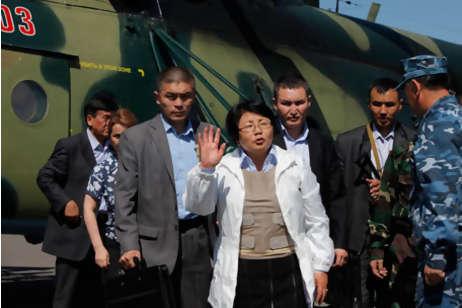OSH, KYRGYZSTAN // Kyrgyzstan's interim president made her first visit to the riot-hit southern town of Osh today, vowing to restore the battered city and work for the return of hundreds of thousands of Uzbek refugees who fled deadly ethnic violence. And US assistant secretary of state Robert Blake, visiting a refugee camp in Uzbekistan about five kilometres from the Kyrgyz border, called for an investigation into the violence and said he was working to ensure the refugees would be able to return home safely.
Earlier today, interim president Roza Otumbayeva arrived by helicopter in the central square of Osh, a city of 250,000. Parts of the city have been reduced to rubble by roving mobs of young Kyrgyz men who burned down Uzbek homes and attacked Uzbek-owned businesses in violence that began late last week. "We have to give hope that we shall restore the city, return all the refugees and create all the conditions for that," she said.
She insisted good will between ethnic Kyrgyz and Uzbeks would end hostilities. The United Nations estimates that 400,000 people fled the country's south after ethnic Kyrgyz killed hundreds - chiefly Uzbeks. Up to 100,000 people have crossed the nearby border into neighbouring Uzbekistan where they are getting food and water in specially created camps. Thousands more remain camped out in squalid conditions on the Kyrgyz side of the border, unable to cross due to Uzbek restrictions.
At one camp in Uzbekistan, in a former polymer plant near the Kyrgyz border, Mr Blake was swamped by throngs of crying refugees, mainly older woman and children, complaining they were desperate to return home but too fearful of fresh attacks to do so. "We ... believe there should be an investigation," he said, an Uzbek interpreter at his side. "We are working with the government of Kyrgyzstan to provide security so you can return home safely,"
Mr Blake, who was accompanied by two-dozen-strong security detail, appeared to be conducting his own probe, asking the refugees if they thought the violence had been organized, as the United Nations and Kyrgyz authorities have claimed. "Yes, of course it was organized, it all happened so unexpectedly," answered one refugee, Nasiba Mamyrdzhanova, from Osh. "We didn't have any weapons, only sticks," said the refugee, wearing a traditional Uzbek long-sleeved dress with a bright headscarf.
Kyrgyz authorities have said the violence was sparked deliberately by associates of Kurmanbek Bakiyev, the president who was toppled in April in a bloody uprising. The UN has said the unrest appeared orchestrated but has stopped short of apportioning blame. Ethnic Uzbeks on Thursday accused security forces of standing by or even helping ethnic-majority Kyrgyz mobs as they slaughtered people and burned down neighbourhoods.
Col Iskander Ikramov, the chief of the Kyrgyz military in the south, rejected allegations of troop involvement in the riots but said the army did not interfere in the conflict because it was not supposed to play the role of a police force. The military and police set up roadblocks and began patrols this week after the worst violence was over. Uzbeks interviewed by Associated Press journalists in Osh said that on one street alone, ethnic Kyrgyz men sexually assaulted and beat more than 10 Uzbek women and girls, including some pregnant women and children as young as 12.
Members of the Kyrgyz community have denied accusations of brutality and have accused Uzbeks of raping Kyrgyz women. Eyewitnesses and experts say many Kyrgyz were killed in the unrest, but most victims appear to have been Uzbeks, traditional farmers and traders who speak a different Turkic language and have been more prosperous than the Kyrgyz, who come from a nomadic tradition. More than 1 million Uzbeks who lived in Kyrgyzstan before the crisis had few representatives in power and pushed for broader political and cultural rights. About 800,000 of them lived in the south, rivalling Kyrgyz in numbers in Osh and Jalal-Abad. Both ethnic groups are predominantly Sunni Muslim.
Meanwhile, in Bishkek, the capital, human rights advocates were gathering in the centre to demand authorities probe the alleged arrest of their colleague in the southern city of Jalalabad, who said he had filmed rioting that spread there. * AP






